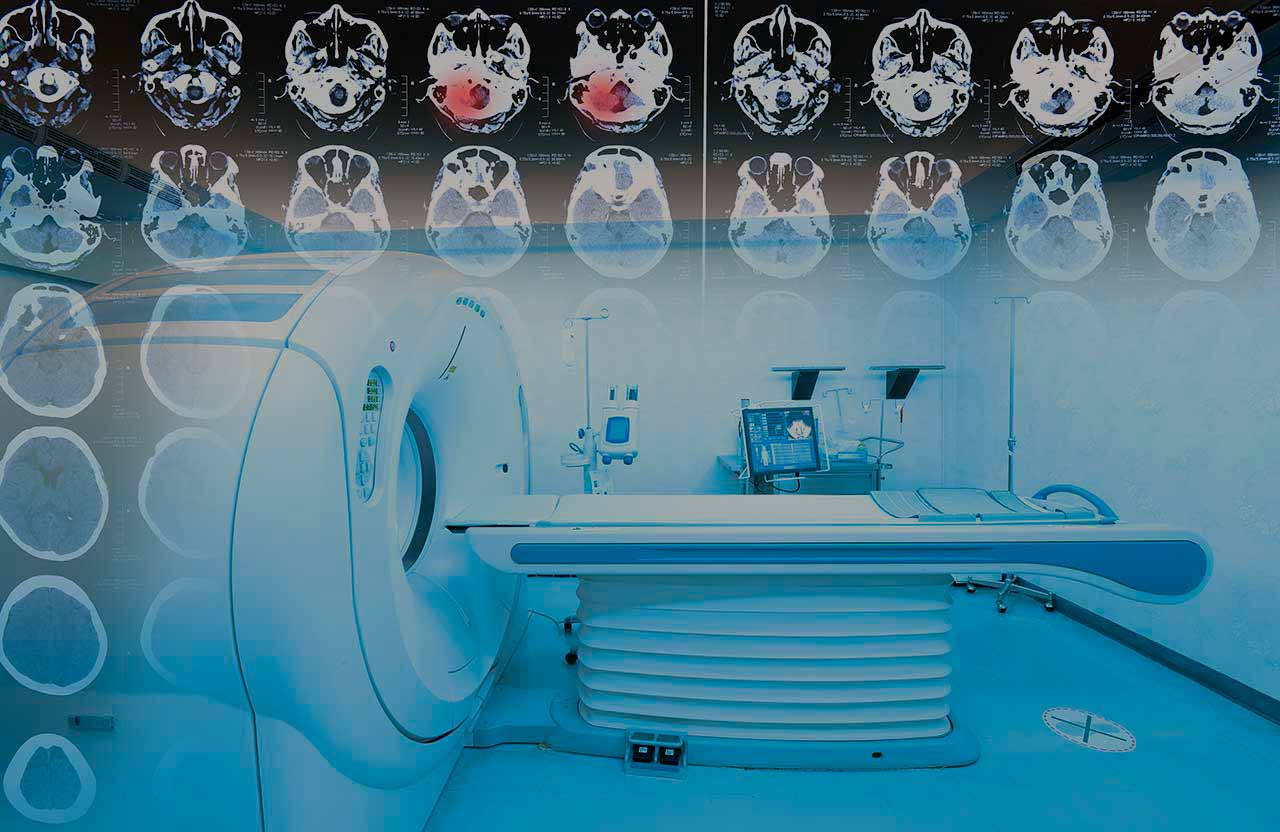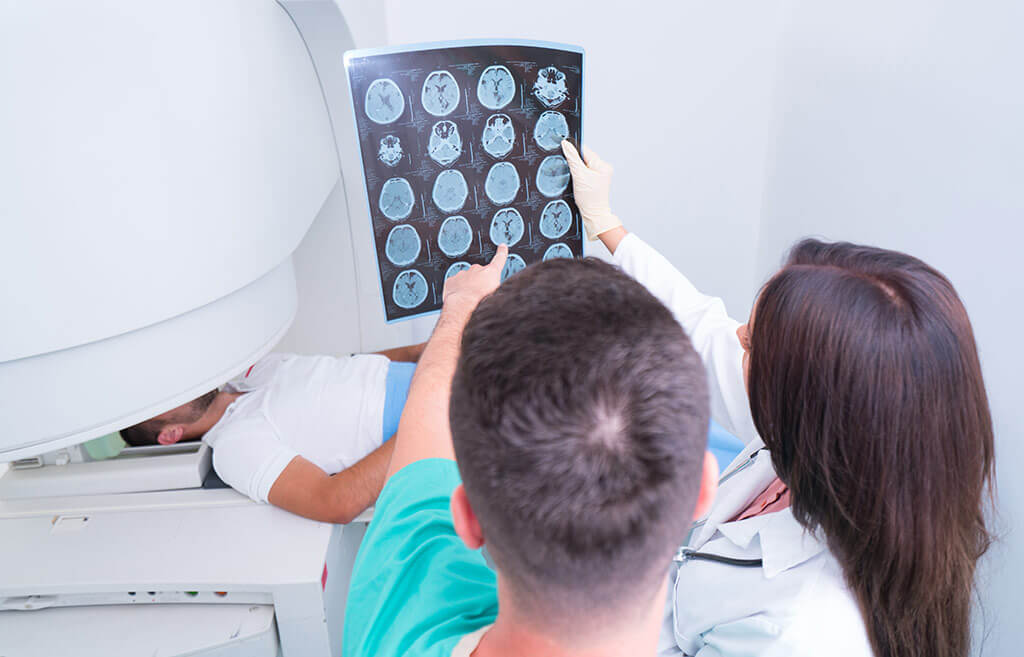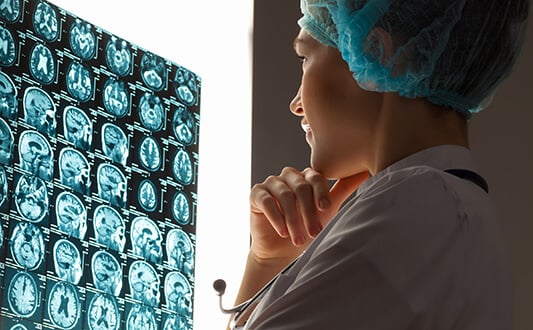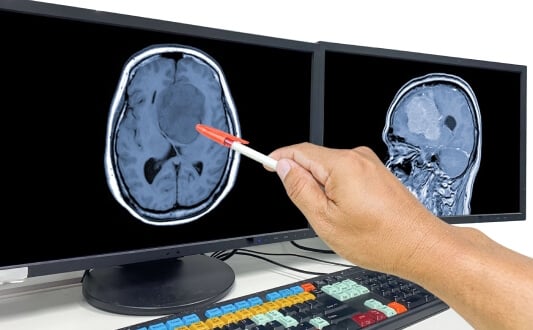Tumors of the brain are group of neoplasms that develop in the structures of the central nervous system. They can be benign or malignant. Some pathologies can be completely cured. In other case, the average life expectancy of a person after diagnosis is only 2-3 years.
Content
- General principles of brain tumor diagnosis
- How to identify a brain tumor at an early stage?
- Clinical diagnostics of brain tumors
- Instrumental studies in brain tumors
- Diagnostics and treatment of brain tumors in Germany
General principles of brain tumor diagnosis
Usually, a patient visits a doctor because of neurological symptoms. They depend on the location of the tumor and the rate of its growth.
Clinical diagnostics of a brain tumor suggests the detection of such symptoms:
- Lack of coordination
- Signs of cranial nerve damage
- Signs of intracranial hypertension
- Epileptic seizures
- Paresis (reduction of muscle strength)
- Speech disorders, etc.
Such signs can be detected by a neurologist or therapist. Later on, if a brain tumor is suspected, the diagnosis is performed by a neurosurgeon. He examines a neurological state of the patient. The symptoms alone are not enough for the detection of brain tumor. However, it is possible to identify at what level the central nervous system has been damaged, and also to assess the severity of the patient's condition. This is important for determining the timing of radical treatment.
Then follows the instrumental diagnosis of brain tumors. The most commonly used method is MRI. This method makes it possible to recognize a brain tumor of 2 mm size.
Magnetic resonance imaging also allows:
- To determine the exact localization of the tumor
- To suggest a histological type of tumor
- To assess whether there is edema and whether the brain structures are shifted
- To specify the location of the neoplasm according to the major vessels (a contrast is required)
- To determine the location of the tumor in accordance with the functionally active zones of the brain
One can diagnose a brain tumor in other way. To do this, CT, angiography, and electrophysiological studies are done. For the analysis of blood in a brain tumor tumor markers (chorionic gonadotropin, alpha-fetoprotein) are studied. Sometimes a brain biopsy is performed, but this is rarely done because of the difficulty to access the tumor. Moreover, the procedure tends to be not safe.
How to identify a brain tumor at an early stage?
Early diagnosis of a brain tumor is a big problem. When the neoplasm is small, the pathology does not appear clinically and the patient does not consult a doctor. But when the brain tumor is too large, the diagnostics can be delayed. After all, when the neoplasm is located in the functionally active parts of the nervous system or when the tumor is deeply localized, the tumor may be inoperable, or the operation leads to a significant neurological deficit.
Unfortunately, there are no reliable ways as how to recognize a brain tumor by symptoms at home. Even an experienced neurologist or neurosurgeon cannot always recognize the brain tumor by clinical signs alone. The presence of cancer swelling can only be assumed on the basis of neurological symptoms. But they not always indicate the presence of a tumor in the brain.
After all, there are dozens of other causes of nerve tissue damage:
- Infection
- Autoimmune processes
- Injuries
- Cardiovascular diseases
If you have even the slightest suspicion on cancer, you can identify a brain tumor if you contact a specialist on time and have an MRI. It's a matter of a few hours. MRI is a non-invasive study. In addition, it is not harmful for health, because it does not give ionizing radiation.
At the moment, MRI is the best way to test a brain tumor for any person with vague neurological symptoms.
Clinical diagnostics of brain tumors
Every day dozens of patients turn to any neurologist or neurosurgeon for help. Some of them will later be diagnosed with oncological diseases of the central nervous system. But not every doctor orders an MRI. This study is too expensive to be considered for screening and to be done periodically. The cancer of this type is relatively rare, taking only 6% in cancer statistics.
First of all, the doctor assesses the symptoms of the patient. He clarifies his complaints and conducts a neurological examination. It does not allow one to identify a brain tumor, but it gives you the opportunity to avoid some negative consequences.
The main symptoms that help diagnose a brain tumor:
- Neoplasms of the frontal lobe: one suffers from mood swings, psychic disturbances, involuntary movements, impaired speech and coordination of movements
- Central gyrus: the brain tumor can be determined by motor and sensory impairments, the appearance of pathological reflexes (Babinski, Oppenheim, Bekhterev)
- Pathology is localized in the temporal lobe, there are epileptic seizures, auditory and olfactory hallucinations, strabismus
- in the occipital lobe: a brain tumor can be detected when one has black and white visual hallucinations, a disorder of color perception, increased intracranial pressure and congested optic discs during neurological examination
- Neoplasms of the lateral ventricles are manifested by nausea, vomiting, dizziness, headache, short-term loss of consciousness, which is associated with hydrocephalus
- To determine a tumor in the brain with localization in the adenohypophysis is possible due to endocrine disorders (hyperproduction of prolactin, somatotropin, TSH) and visual disturbances due to atrophy of the optic nerves
After a neurological examination, patient needs instrumental diagnostics, since it is impossible to detect a brain tumor with the help of symptoms alone.
Instrumental studies in brain tumors
Instrumental studies help to determine whether there is or not a brain tumor. These are the following diagnostic procedures:
- Craniography is an X-ray of the skull in two projections without contrasting. The study is considered obsolete. But it is still widely used in clinics in developing countries. It allows one to identify a large brain tumor.
- Electroencephalography makes it possible to identify focal symptoms. It assesses the functional disorders of the brain.
- Echoencephalography is an ultrasound study. It detects brain tumor of a large size and localization in the region of the cerebral hemispheres. It helps to detect hydrocephalus and ventricular expansion. Using a Doppler meter helps to evaluate the blood flow and avoid increased intracranial pressure.
- Lumbar puncture is a reliable way of determining intracranial pressure. Lumbar puncture in such cases is dangerous for the patient's life. It can cause brain dislocation, its wedging and stops breathing.
- CT and MRI are the most reliable methods to determine if there is a brain tumor. Since these are non-invasive diagnostic procedures, they are often used as primary methods of examination. The tumor of the brain on MRI is determined even at a size of 2-3 mm due to the high resolution of modern devices. By the appearance of a brain tumor one can assume its histological type.
- Cerebral angiography is an X-ray of vessels using contrast. Contrast is introduced into the carotid or vertebral artery. In recent years, digital angiography has been used more often. It is safer, since the contrast is introduced into the peripheral vein. CT and MRI can also be performed.
- Gammaencephalography is a radioisotope tumor scan. This method suits for detecting multiple small formations, including metastatic brain damage. With the help of this method, one can identify a brain tumor with its blood vessels - glioblastomas, meningiomas.
- PET (positron emission tomography) is more often used in developed countries. A substance is injected into the bloodstream which accumulates in different amounts in the brain tissues, depending on the level of their blood supply. The method helps in the differential diagnostics of brain tumors by other diseases that give neurological symptoms.
- Biopsy - brain tumors can have a different histological structure, and it is required to take a tissue for an analysis. One uses either a stereotactic frame or a neuronavigation system. In this case, it is not required to fix the patient's head in a tough manner. The biopsy specimen is taken with the needle.
Diagnostics and treatment of brain tumors in Germany
Most people with middle or high income prefer to trust their health to doctors in developed countries, such as Germany. German clinics are well equipped, and the staff potential here is one of the best in the world because of proper education. In addition, the best neurosurgeons from all over the world come to Germany in search of a better life and professional growth.
Company Booking Health helps to organize examination and treatment in one of the German clinics. For over 15 years we have been engaged in medical tourism and we are one of the world leaders in this industry. Our company provides the patients from 75 countries with high-quality service and the Booking Health service for online treatment abroad is available in 11 languages.
We are ready to choose the best clinic for you according to the following factors:
- Percentage of successfully treated patients with brain tumors
- Low risk of complications
- Well-trained medical personnel
- Professionally-equipped clinic
Thanks to our services, you will not only get quality treatment and save time, but you can also avoid unnecessary costs. We will help you save up to 70% on medical and diagnostic services. In addition, we fully organize your treatment in Germany and take into account everything, up to the smallest details, so that your stay in this country is comfortable.
Choose treatment abroad and you will for sure get the best results!
Authors:
This article was edited by medical experts, board-certified doctors Dr. Nadezhda Ivanisova, and Dr. Bohdan Mykhalniuk. For the treatment of the conditions referred to in the article, you must consult a doctor; the information in the article is not intended for self-medication!
Our editorial policy, which details our commitment to accuracy and transparency, is available here. Click this link to review our policies.
Sources:
Read:
Innovative methods of brain cancer treatment in Germany
Don't know where to start?
Contact Booking Health







